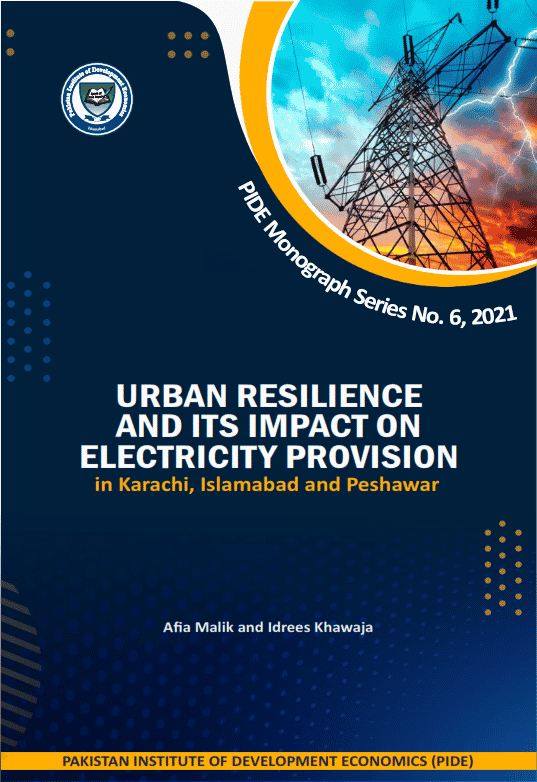Urban Resilience and its Impact on Electricity Provision in Karachi, Islamabad and Peshawar
Rapid urbanisation places pressure on existing infrastructure facilities and the carrying capacity of cities. Pakistan has one of the highest population and urbanisation growth rates in the world. Urban resilience is the capacity of cities to act efficiently so that their residents and workforce, especially the vulnerable people endure the stresses or shocks they encounter in their everyday lives. Literature suggests that in cities that are less resilient and have weak governance systems, it is difficult for various utilities to perform efficiently. This study explores urban resilience across three cities in Pakistan – Karachi, Islamabad and Peshawar; and examines the linkage between the operational (transmission and distribution losses, safety systems, outages etc.) and commercial (recovery rates) performance of a utility and the urban resilience of the city. We find the Federal capital Islamabad relatively more resilient as compared to Karachi and Peshawar. Although quite close, resilience in Karachi is slightly better than in Peshawar due to greater economic vibrancy and lesser poverty incidence as compared to Peshawar. Greater resilience of Islamabad, relative to Karachi and Peshawar, is also reflected in the performance of Islamabad Electric Supply Company (IESCO).
However, Karachi is different from the other two cities because of weak governance and fragmented institutional structure. Though all three cities are suffering from the impact of urban sprawl, its impact on Karachi is relatively greater in absolute terms, and started much earlier as compared to urban sprawl in the other two studies. That’s why deeper and has its impact on the efficient working of various utilities – gas and electricity etc. From an electricity utility perspective, IESCO is facing less challenges as compared to both Peshawar Electric Supply Company (PESCO) and K-Electric. However, the nature of the challenges is different in both K-Electric and PESCO. K-Electric is a privatised entity operating in a regulated environment. It has to deal with umpteen number of organisations in Karachi for approvals. It faces delays in tariff determination, delays in the disbursements of Tariff Differential Claims, and delays in receivables from the government departments. Theoretically, it should have been relatively easier for K-Electric as a privatised company, to make investment decisions to upgrade or replace distribution infrastructure, but the company still needs regulatory approvals from NEPRA. K-Electric, despite all challenges/ hurdles, is improving its performance via building consumer trust through various initiatives such as ‘Project Sarbulandi’ and upgradation of existing distribution infrastructure across the city. Whereas, PESCO’s (state-owned company) main challenges are human resources constraints and lack of capital, and delays in disbursements of public funds for the upgradation of existing infrastructure, which is old and damaged. ‘Sarbulandi’ type projects should also be adopted in high-loss areas, not only in PESCO but also in other distribution companies in the country. Safety hazards from a utility perspective are common in all three cities as a result of illegal or informal housing, expansions, encroachments and urban resilience is found to be directly correlated with safety. Better planned cities enable safer service provision as in Islamabad while IESCO is also more vigilant and keeping a daily progress report on the identification and removal of safety hazards. This practice should also be scaled up by PESCO and K-Electric as literature suggests more monitoring always leads to better outcome. Support of civic and law enforcement agencies is compulsory for curbing these safety hazards. A city economy depends on reliable electricity services. Thus, building the resilience of electricity systems is crucial for human welfare and economic growth. In such an environment, a utility company must have the financial capacity for timely periodic maintenance and to remain prepared for absorbing the effects of dangerous events in an efficient manner. Besides, without the support of relevant government departments/ city authorities, it is not possible for the utility company to work efficiently.




